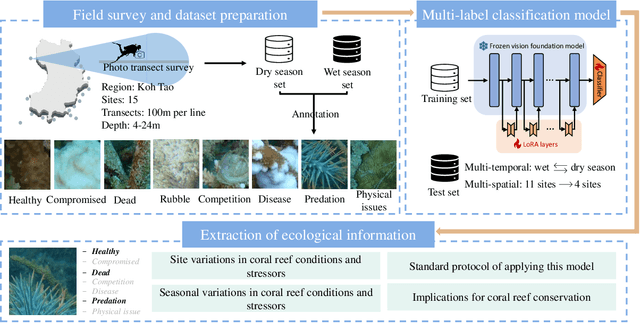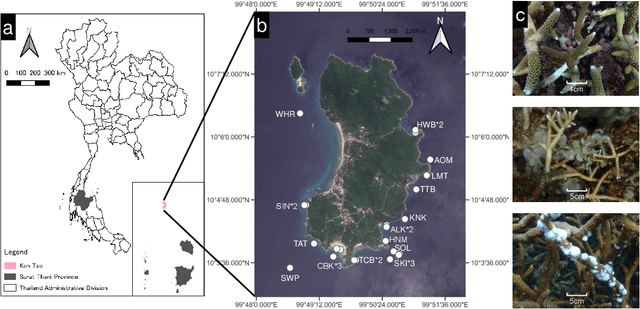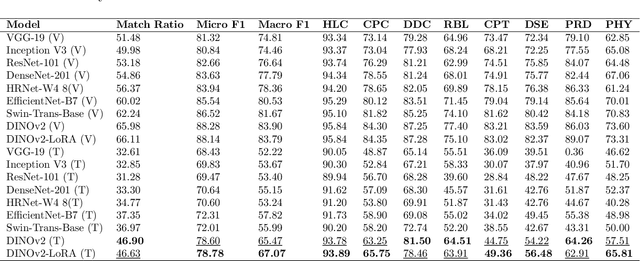Jundong Chen
Multi-label classification for multi-temporal, multi-spatial coral reef condition monitoring using vision foundation model with adapter learning
Mar 29, 2025



Abstract:Coral reef ecosystems provide essential ecosystem services, but face significant threats from climate change and human activities. Although advances in deep learning have enabled automatic classification of coral reef conditions, conventional deep models struggle to achieve high performance when processing complex underwater ecological images. Vision foundation models, known for their high accuracy and cross-domain generalizability, offer promising solutions. However, fine-tuning these models requires substantial computational resources and results in high carbon emissions. To address these challenges, adapter learning methods such as Low-Rank Adaptation (LoRA) have emerged as a solution. This study introduces an approach integrating the DINOv2 vision foundation model with the LoRA fine-tuning method. The approach leverages multi-temporal field images collected through underwater surveys at 15 dive sites at Koh Tao, Thailand, with all images labeled according to universal standards used in citizen science-based conservation programs. The experimental results demonstrate that the DINOv2-LoRA model achieved superior accuracy, with a match ratio of 64.77%, compared to 60.34% achieved by the best conventional model. Furthermore, incorporating LoRA reduced the trainable parameters from 1,100M to 5.91M. Transfer learning experiments conducted under different temporal and spatial settings highlight the exceptional generalizability of DINOv2-LoRA across different seasons and sites. This study is the first to explore the efficient adaptation of foundation models for multi-label classification of coral reef conditions under multi-temporal and multi-spatial settings. The proposed method advances the classification of coral reef conditions and provides a tool for monitoring, conserving, and managing coral reef ecosystems.
Beyond Similarity: Personalized Federated Recommendation with Composite Aggregation
Jun 06, 2024Abstract:Federated recommendation aims to collect global knowledge by aggregating local models from massive devices, to provide recommendations while ensuring privacy. Current methods mainly leverage aggregation functions invented by federated vision community to aggregate parameters from similar clients, e.g., clustering aggregation. Despite considerable performance, we argue that it is suboptimal to apply them to federated recommendation directly. This is mainly reflected in the disparate model architectures. Different from structured parameters like convolutional neural networks in federated vision, federated recommender models usually distinguish itself by employing one-to-one item embedding table. Such a discrepancy induces the challenging embedding skew issue, which continually updates the trained embeddings but ignores the non-trained ones during aggregation, thus failing to predict future items accurately. To this end, we propose a personalized Federated recommendation model with Composite Aggregation (FedCA), which not only aggregates similar clients to enhance trained embeddings, but also aggregates complementary clients to update non-trained embeddings. Besides, we formulate the overall learning process into a unified optimization algorithm to jointly learn the similarity and complementarity. Extensive experiments on several real-world datasets substantiate the effectiveness of our proposed model. The source codes are available at https://github.com/hongleizhang/FedCA.
Deep learning for multi-label classification of coral conditions in the Indo-Pacific via underwater photogrammetry
Mar 12, 2024



Abstract:Since coral reef ecosystems face threats from human activities and climate change, coral conservation programs are implemented worldwide. Monitoring coral health provides references for guiding conservation activities. However, current labor-intensive methods result in a backlog of unsorted images, highlighting the need for automated classification. Few studies have simultaneously utilized accurate annotations along with updated algorithms and datasets. This study aimed to create a dataset representing common coral conditions and associated stressors in the Indo-Pacific. Concurrently, it assessed existing classification algorithms and proposed a new multi-label method for automatically detecting coral conditions and extracting ecological information. A dataset containing over 20,000 high-resolution coral images of different health conditions and stressors was constructed based on the field survey. Seven representative deep learning architectures were tested on this dataset, and their performance was quantitatively evaluated using the F1 metric and the match ratio. Based on this evaluation, a new method utilizing the ensemble learning approach was proposed. The proposed method accurately classified coral conditions as healthy, compromised, dead, and rubble; it also identified corresponding stressors, including competition, disease, predation, and physical issues. This method can help develop the coral image archive, guide conservation activities, and provide references for decision-making for reef managers and conservationists. The proposed ensemble learning approach outperforms others on the dataset, showing State-Of-The-Art (SOTA) performance. Future research should improve its generalizability and accuracy to support global coral conservation efforts.
 Add to Chrome
Add to Chrome Add to Firefox
Add to Firefox Add to Edge
Add to Edge